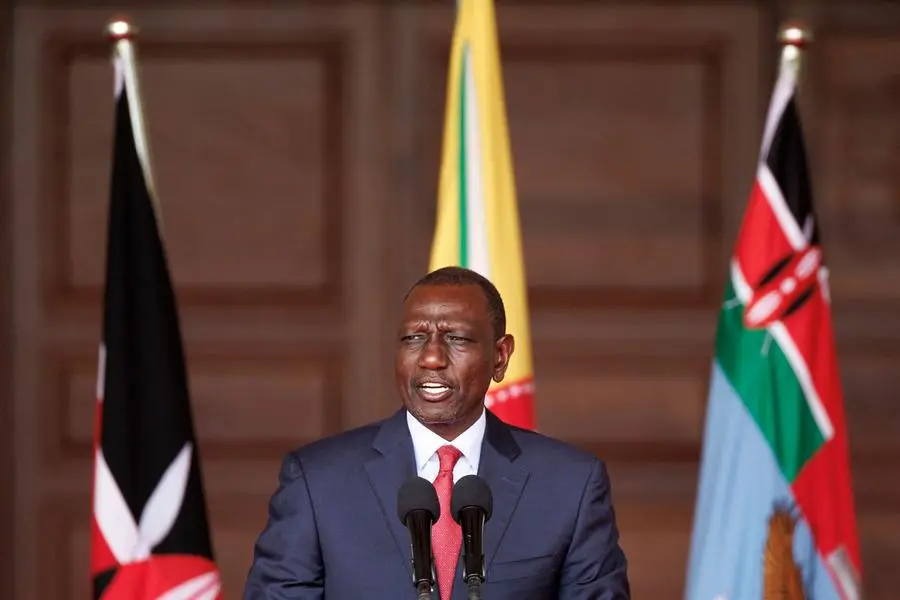PHOTO
Kenya's President William Ruto campaigned for the August 2022 election as a man of the people, but deadly protests over his economic policies have demolished his image domestically and tarnished his standing abroad, analysts say.
The embattled leader is facing searing criticism since he won the hotly-contested election, with the discontent -- mostly led by young Gen-Z Kenyans -- rattling the nation, a traditionally stable Western ally in an often chaotic region.
The protests were sparked by proposed tax hikes in the 2024 finance bill, but have snowballed into wider disillusionment at Ruto's top-down style of governance, resulting in the most serious crisis of his presidency -- and catching his administration totally off guard.
At least 60 people have been killed since the demonstrations began in mid-June, with police sometimes firing live bullets at protesters, and dozens more are missing, according to a consortium of lobby groups including the government-funded rights commission KNCHR and Amnesty Kenya.
Ruto had initially described the agitation over what Kenyans see as widespread government corruption and inefficiencies as "treasonous" and vowed to quash the unrest "at whatever cost".
But he later backtracked, taking a series of drastic steps to address public anger including withdrawing the finance bill, dismissing almost his entire cabinet and making deep budget cuts.
Activists have vowed to return to the streets Thursday to again demand the resignation of Ruto -- who built a career on defeating expectations -- after he reappointed half of his sacked cabinet and co-opted four heavyweight opposition politicians.
- 'Playing catch-up' -
The 57-year-old Ruto "misjudged the depth of citizens' anger", wrote Fergus Kell, Africa programme manager at the London-based Chatham House think-tank.
He and "his political allies have been left playing catch-up with a haphazard range of concessions", Kell said in an analysis last week.
Kenya has a long history of political elites joining forces in times of crisis, effectively leaving the country without an opposition.
Often, such deals have left the population with no benefits as politicians harvest jobs and perks.
"It is far from clear that such an approach can deliver the same results this time around," Kell said, adding that it "may represent a misreading of newly decentralised patterns of protest".
The entry of veteran opposition leader Raila Odinga's men into government has opened fissures in the ruling party. Ruto's deputy Rigathi Gachagua has said he was being frustrated in the government -- echoing Ruto's fallout with his predecessor Uhuru Kenyatta.
Public frustration built over months as Ruto's cash-strapped government indulged in a lavish spending spree while austerity measures took a toll on citizens suffering high costs of living.
Ruto, one of Kenya's richest men, did little to forestall the crisis, analysts said.
As president, he has made more than 60 trips abroad -- including taking a luxurious private jet to the US where he was treated to a White House state dinner.
He has sought to boost his credentials as an African climate champion and peace mediator in conflicts in Sudan and the Democratic Republic of Congo.
Ruto's presidency has been "below expectation", Macharia Munene, professor of international relations at Nairobi's United States International University, told AFP.
"It is due to his disdain for competence and knowledge."
- 'In state of limbo' -
Observers attribute Ruto's aggressive ambition to the fact he had to struggle for everything he has achieved in life from his lowly start in Kenya's Rift Valley.
His fortune is now said to run into many millions of dollars, with interests spanning hotels, real estate and insurance, as well as a vast chicken farm.
He first got a foot on the political ladder -- and detractors claim, access to funds -- in 1992.
After completing studies in botany, he headed a youth movement tasked with drumming up support for the autocratic then-president Daniel arap Moi.
The protests have left Ruto caught between pressure from international lenders to pay down Kenya's massive $78 billion debt and a public finding it hard to pay for basic necessities.
Ruto, who was deputy president for a decade, must now create jobs and rebuild trust among the striving Kenyans, or "hustlers", he pledged to fight for in his 2022 election campaign.
"The onus is on the Kenyan leader and his colleagues to repair their relationship with the public," said Meron Elias, an analyst at the International Crisis Group.
"Also, Ruto could offer a clear timeline for carrying out the cost-cutting measures and other reforms he has promised given widespread scepticism about his sincerity."
Kenya has one of the most dynamic economies in East Africa, but a third of its 52 million people live in poverty.
Private sector activity dropped in July amid the public unrest, while ratings agencies have further downgraded Kenya's credit rating.
"The country's operating environment will remain in a state of limbo until the government offers more guidance on future policies and reforms," Oxford Economics said this week.





















